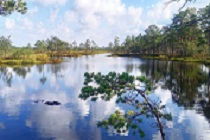 The regular meeting of the Peribaltic Working Group, organised under the auspices of the International Union for Quaternary Research (INQUA), took place in Pärnau and on the islands of Saaremaa and Hiiumaa (western Estonia) from 25 to 30 September 2024.
The regular meeting of the Peribaltic Working Group, organised under the auspices of the International Union for Quaternary Research (INQUA), took place in Pärnau and on the islands of Saaremaa and Hiiumaa (western Estonia) from 25 to 30 September 2024.
The meeting was attended by nearly 50 participants representing Estonia, Lithuania, Austria, Germany, Finland and Poland. The Polish Geological Institute – National Research Institute was represented by Joanna Rychel, PhD, from the Department of Regional and Compositional Geology.
The first day included paper and poster sessions, the main topics of which were research methods, mapping, features and forms of young glacial landscapes, periglacial processes, boundary processes and reconstruction of climate change.
As a representative of an interdisciplinary research team, Joanna Rychel, PhD, presented a palaeogeographic reconstruction of the northern part of the Suwałki Lake District during the late glacial period of the last glaciation.
The next four days of the symposium were devoted to field trips, during which eighteen stands covering a diverse range of topics were presented.

Group photo of participants of the International Field Symposium INQUA Peribaltic Working Group in Pärnau

The picturesque Tolkuse bogs as a training ground for reconstructing Holocene relative sea level changes

View of the Kaali crater on the island of Saremaa, formed by the impact of a fragmented meteorite some 3,237 years BP (before present, assumed to be 1950)

Exposure in glaciofluvial sediments of the marginal zone in the Palivere area on the island of Hiiumaa as a result of mapping of the South and East Baltic eskers
Text and photos: Joanna Rychel














 PGI-NRI offer
PGI-NRI offer Mineral resources of Poland
Mineral resources of Poland  Oil and Gas in Poland
Oil and Gas in Poland 




 Subscribe to RSS Feed
Subscribe to RSS Feed